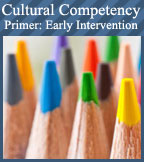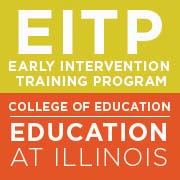Cultural Competency Primer: Early Intervention & Pre-School
Please scroll down for outcomes per discipline and other information, such as Target Audience, Course Content and Level
Course Outline:
Course intent: To provide early intervention providers with the clinical background to understand the relevant issues regarding cultural competency so as to – by virtue of their front-line entry access into home of very young children – educate, and help prevent cultural incompetency by virtue of their role as an early intervention provider providing therapeutic intervention in the home.
Relevance to occupational therapy, speech language pathologists, physical therapists and other disciplines: Therapist providers and educators in the early intervention setting are on the front line of treating children when visiting the home in the early intervention setting, and must be trained in appropriate cultural competency.
Classification Codes OT:
Professional Issues
o Contemporary Issues & trends
o Evidence Based Practice
o Globalization of Profession
o Professional Development & Continued Competency
Target level: All practitioners
Prerequisites: None
Outcomes:
Provider will be able to: Identify the components of multicultural attitudes, language, and behavior mandated in health care and education by full legislative backing of Presidential Executive Order 13166, Title VI of the Civil Rights Act, and the Americans with Disabilities Act
Provider will be able to: Describe practical situations via examples of real/hypothetical situations; understand the theoretical basis for decision making as well as legal standards of behavior consistent with the Texas (and other State board) Practice Acts & APTA code of ethics for professional conduct.
Provider will be able to: Explain how the anthropological notion that all children are equal when it comes to receiving healthcare and education runs counter to the bigoted value of ethnocentrism
Provider will be able to: Identify self-examination and introspection of one’s own personal bias, and how these influence our professional attitudes and behavior when early intervention providers relate to children and families
Provider will be able to: Identify demographic trends in the United States, and the disparity in receiving of health and educational services among minorities
Provider will be able to: Identify how the unique mores and cultural approaches differ among differing races, cultures, and ethnicities, and how best to incorporate professional sensitivities into our practice.
Provider will be able to: Identify case examples of prejudice, bias, stereotyping, and discrimination that may occur in the early intervention setting, and how early intervention providers may work toward countering these trends in their practice
Provider will be able to: Describe the role of “language as a barrier” and “cultural literacy,” as well as the role of and benefit of interpreters versus translators.
Provider will be able to: Describe the ethical constraints and professional obligations imperative to early intervention professionals with respect to implementing culturally competent and culturally sensitive practice attitudes in professional practice.
Speech Language Pathology
Target Audience: Speech Language Pathologists, Speech teachers and Audiologists, Occupational therapists, COTA's
Course Level: Various
Subject Code: 7030 Cultural and Linguistic Diversity in Education, Training, Service Delivery, Public Policy
Content Area: Related
AGENDA:
-Introduction
- Demographic Realities
- Trends in Population Growth
- Historical Influences
-Ethnocentrism
-Legislative Changes to Improve Opportunities for Minorities
-Example of Cultural Competency in Early Intervention
- What is Cultural Competency? -Definitions in Cultural Competency
-Concepts in Cultural Competency
- Select Examples in Appropriate Cultural Competence in the Early Intervention Setting
-Becoming Culturally Competent: An Ongoing Internal Dialogue
-Questions to Ask Yourself
-Whenever Interacting With a Family
-Creating Internal Change in your Values and Attitudes
- Trans-cultural Communication Techniques
-Case Studies
-Cultural literacy
- Communication: Verbal vs. Non-Verbal
- Cultural Insights: Example of Language Barrier Literacy
- Assistance and the Use of Interpreters







